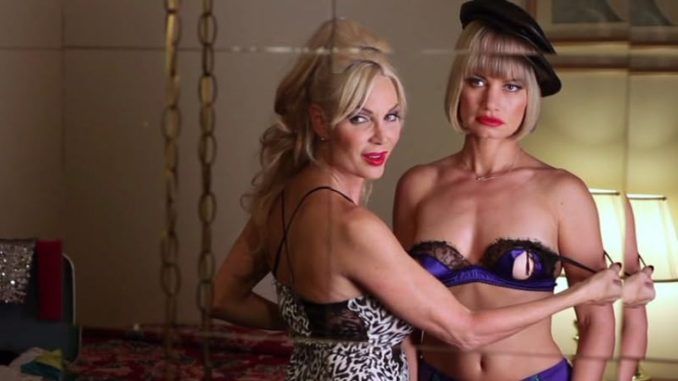
Rating: C+
Dir: Rena Riffel
Star: Rena Riffel, Peter Stickles, Shelley Michelle, Greg Travis
It has been almost a week since I saw this, and I still don’t really have much of a clue what the hell we watched. Is it a homage to Showgirls? A parody of Showgirls? Or a bizarre, 145-minute vanity project, written, directed by and starring an actress who was involved in not one, but two, box-office bombs about taking your clothes off for an audience [Showgirls and Striptease]? This had a strange and twisted journey to creation. There were originally plans announced for a German-produced sequel, under Marc Volander, featuring Riffel. Which apparently came as a surprise to her. The pair did end up trying to collaborate, but that ended up going to hell in a handbasket,
He went his way, making Showgirls: Exposed, which generated a trailer, but may or may not have generated a feature: one Amazon review says, “There isn’t actually a movie and possibly never was. The DVD is two trailers followed by some screen saver type stuff of strppers interacting with a reluctant dog and runs under an hour.” Rena, however, made her own damn movie. The central character is Penny Slot (Riffel), a Las Vegas stripper, who yells “I’m a dancer!” at anyone who points this out, with such frequency that it could be a drinking game all on its own. She heads off to Los Angeles with the vague plan of meeting a director and becoming a proper ballerina somehow, so she can become the leading lady of “Star Dancer”, an incredibly-awful local TV show, which public access cable (do they still have that?) would reject out of hand.
Hardly is she under route then she accidentally leaves her DNA at a murder scene when she stops for a pee. Once she gets there, she ends up innocently becoming a prostitute, whom no man can resist [writing yourself a role like that definitely reeks of a vanity project, though Riffel has aged well enough in the 17 years since Showgirls], becoming best buddies with the current “Star Dancer” lead (Michelle, best known for being Julia Roberts’ body double in Pretty Woman), bumping into a pseudo-occult group and almost starring in a snuff movie. On top of all that, this is additionally full of dialogue, scenes and minor characters lifted from or inspired by Showgirls: among the last are the casting director, Nomi’s boyfriend and the guy who picks her up hitch-hiking at both the beginning and end, all playing more or less the same roles here.
Elizabeth Berkely, Gina Gershon and Kyle McLachlan, however, are notable by their absence. Also not present is any consistent tone: half of this seems like an Epic Movie style parody of the original, but other scenes, such as when the two leading ladies go at it in a swimming-pool, are more loving recreation. The latter would be more in line with Riffel’s comments, where she expresses a deep – and, importantly, unironic – affection for Verhoeven’s work. I’m certainly down with that, since I think it’s often unjustly criticized, but I’m not sure how I feel about this. For, make no mistake: this is dreadful in many ways, and the budget, which might have paid for several seconds of Showgirls, is a bigger player than any of the performers.
That’s clear from early on, when the stripclub where Penny works, has her giving lap-dances on a pool table, and shows up in wobbly sound, other cheapjack locations and some performances apparently selected purely on the basis of who Riffel could get. It’s definitely far too long, meandering its way with plot threads that verge on the Lynchian [Riffel also appeared in Mulholland Drive, which may explain the gratuitous shot of its road-sign at one point], and while respect is due for Riffel going out there and getting this made, that does not, in itself, justify the many, obvious weaknesses.
However, at one point, a character says to Penny, “You’re not dumb, you just play dumb.” One wonders how much that comment applies not just to the heroine but to Riffel, who was a pre-med student in college before pursuing acting. Or indeed, many actresses in Hollywood, especially those who rely significantly on their looks. Even though Penny’s response is, “Like a possum?”, the line between the actress and her most famous character feels blurred, in a way that more renowned directors manage less effectively, such as Abel Ferrara’s use of Madonna in Dangerous Game. The bottom line here is, this review is about twice my normal length, and that says a lot. It’s such a damn strange creature, that we are probably going to remember and talk about it, a long while after shinier, better-made and more expensive productions have been consigned to the rubbish-bin of my memory.
